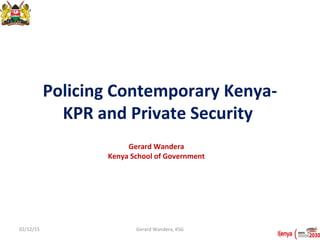Gerard Wandera, Deputy Director, Kenya School of Government (KSG)
- 1. Policing Contemporary Kenya- KPR and Private Security Gerard Wandera Kenya School of Government 02/12/15 Gerard Wandera, KSG
- 2. LAIKIPIA COUNTY CONSEVANCIES 02/12/15 Gerard Wandera, KSG
- 3. 02/12/15 Gerard Wandera, KSG
- 4. Introduction ŌĆó The concept of Private Security ŌĆó The KPR and Rangers: Who are they? ŌĆó Difference between KPRs and Rangers ŌĆó Key Issues ŌĆō Changing roles ŌĆō Policy and oversight ŌĆō SALW ŌĆō Elitism ŌĆō Politicization ŌĆó Conclusion 02/12/15 Gerard Wandera, KSG
- 5. Quote The UN, whose agencies have a large presence in the Nairobi, reckon the number of burglaries in Nairobi doubled to 300 from the last quarter of 2013 to the first quarter of this year. Private security companies, who are reckoned to employ more than 100,000 people in Nairobi, are thriving. Ever more cameras, fences and walls are going up, with barbed wire strung along the top. Some robbers, dressed as guards, have taken over entire residential compounds and methodically cleaned out all the houses (The Economist, May 2014). This work examines the increasing growth of PSCs with a bias towards KPRs. 02/12/15 Gerard Wandera, KSG
- 6. Private security ŌĆó A person or body of persons, other than a state agency, registered to provide private security services ŌĆó The includes nongovernmental, private sector practice, and quasi-public police ŌĆó Process of embedding in law ( Private Security Regulations Bill 2014) 02/12/15 Gerard Wandera, KSG
- 7. Core elements of Private Security ’üČ physical security, personnel security, information systems security, investigations, loss prevention, risk management, legal aspects, emergency and contingency planning, fire protection, crisis management, disaster management, counterterrorism, competitive intelligence, executive protection, violence in the workplace, crime prevention, crime prevention through environmental design (CPTED), and security architecture and engineering. 02/12/15 Gerard Wandera, KSG
- 8. KPR and Rangers: Who are they ŌĆó KPR is a volunteer auxiliary force recruited from a resident Sec. 110 (1) of NPSA ŌĆó Allowed to take other employment Sec. 71 (1) ŌĆó Armed by the State to provide security in the same locality. ŌĆó Provisions of retirement is after 4 years, however hardly Sec. 112 ŌĆó No clarity of reporting ie County Police Commander or County Ap Commander Sec 110 (3) ŌĆó Many citizens consider them very important 02/12/15 Gerard Wandera, KSG
- 9. KPRs Traditional (Outside) KPR modern (Scouts/rangers) (Inside) No uniform or borrowed uniforms Uniform provided Work for communities Work for conservancies Minimal or no training Trained in Manyani by KWS and by British ex-soldiers No salary or compensation Salaried & compensated in case of injury/death No promotion Promotion is clear Armed by OCPD Some armed by OCPD Comparison of KPRs and or Rangers 02/12/15 Gerard Wandera, KSG
- 10. 02/12/15 Gerard Wandera, KSG
- 11. Issues: Changing Roles of KPRs ŌĆó Metamorphosis of KPR roles ŌĆó Privatisation ŌĆó Urbanisation, due to changing economy ŌĆō commoditization and the desire to earn real money ŌĆó Livelihood is an important factor in these changes ŌĆó Livelihood also the most important factor in arms misuse ŌĆó Scouts funding may not be sustainable 02/12/15 Gerard Wandera, KSG
- 12. Issues: Policy and Oversight ŌĆó Lack of policy on these changes ŌĆó Proliferation of institutions responsible for scouts ŌĆō bringing confusion ŌĆó OCPD unable to oversee scouts properly and lacks resources to monitor ordinary KPRs ŌĆó Police reform regulations for KPR not ready yet they are a bigger force than the police in some areas 02/12/15 Gerard Wandera, KSG
- 13. Issues: SALW ŌĆó Licit arming, and misuse due to poor training, supervision and lack of pay ŌĆó May lead to localized arms race ŌĆó Potential for formation of militias ŌĆó If scouts funding dries up this risk is significant ŌĆó Land conflict is volatile in Laikipia ŌĆō erosion of communal land could trigger conflict 02/12/15 Gerard Wandera, KSG
- 14. Issues: Elitism ŌĆó Privatisation of security in Laikipia ŌĆó State provision of arms ŌĆó Diversion of security from other areas ŌĆó A ŌĆ£public goodŌĆØ becomes enjoyed by the few ŌĆó Community outside seek an alternative in the form of militias/vigilante 02/12/15 Gerard Wandera, KSG
- 15. Issues: Politicization ŌĆó KPRs are from a single ethnic group ŌĆó Often linked to their MP ŌĆó Potential for recruitment into ŌĆ£private armiesŌĆØ should the time arise ŌĆó Under new dispensation, the Governor as elected leader could misuse them. 02/12/15 Gerard Wandera, KSG
- 16. Conclusions ŌĆó A private rancher recommended, ŌĆō ŌĆ£KPRs are strength, because they are local. The police are outsiders, they are not local and they are not risk takers like KPR, so it is useful for them to help the police. What is needed for KPR is good pay, strict disciplinary procedures, a contract on service delivery, and training like the police. Reporting should be on a clear weekly or monthly basis.ŌĆØ[i][i] Interview, a private rancher, January, 2012. 02/12/15 Gerard Wandera, KSG
- 17. Conclusions ŌĆó Livelihood is a vital consideration ŌĆó Policy has not kept pace with change ŌĆó It is vital that the state get on top of what is going on and resource OCPDs to manage KPRs adequately ŌĆó Politicians should be kept out of security altogether 02/12/15 Gerard Wandera, KSG
















![Conclusions
ŌĆó A private rancher recommended,
ŌĆō ŌĆ£KPRs are strength, because they are local. The
police are outsiders, they are not local and they
are not risk takers like KPR, so it is useful for them
to help the police. What is needed for KPR is good
pay, strict disciplinary procedures, a contract on
service delivery, and training like the police.
Reporting should be on a clear weekly or monthly
basis.ŌĆØ[i][i] Interview, a private rancher, January, 2012.
02/12/15 Gerard Wandera, KSG](https://image.slidesharecdn.com/wandera-policingcontemporarykenya-kprandprivatesecurity-150212044228-conversion-gate01/85/Gerard-Wandera-Deputy-Director-Kenya-School-of-Government-KSG-16-320.jpg)
